Analyzing Ethical and Legal Issues in HIV Status Disclosure
VerifiedAdded on 2020/11/23
|8
|1880
|230
Essay
AI Summary
This essay delves into the complex ethical and legal considerations surrounding the disclosure of an individual's HIV status without their explicit consent. The paper examines the delicate balance between respecting patient autonomy and upholding public health responsibilities. It explores the ethical principles, such as respect for autonomy and deontology, and legal aspects, including human and employment rights, that influence decisions regarding disclosure. The essay highlights the potential for discrimination and social stigma faced by individuals with HIV and analyzes the circumstances under which disclosure might be deemed necessary, such as to prevent the spread of the virus to sexual partners or during medical procedures. It emphasizes the importance of healthcare professionals gaining the trust of patients and protecting their privacy while also ensuring the safety of others. The essay references several academic sources to support its arguments, providing a comprehensive overview of the subject.
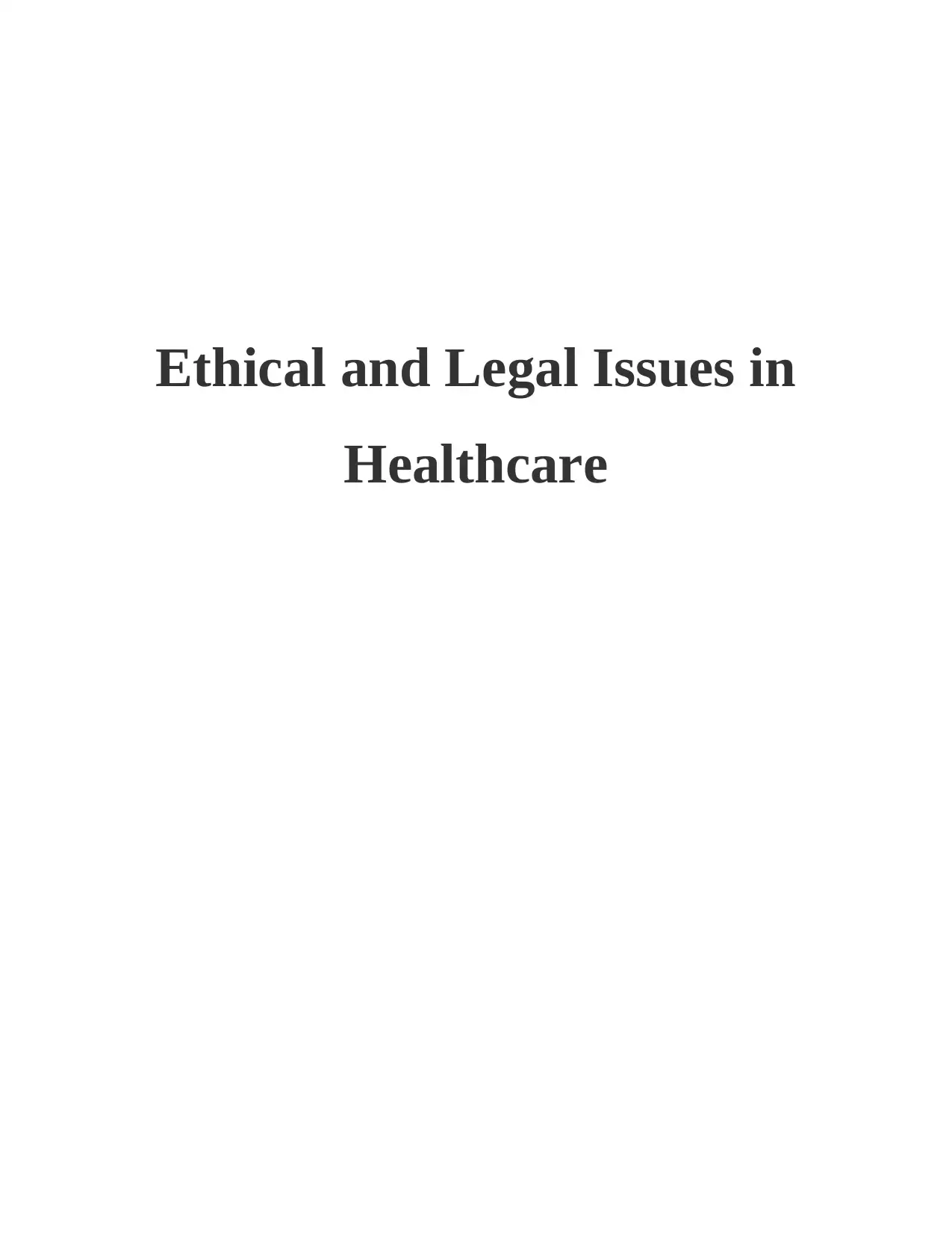
Ethical and Legal Issues in
Healthcare
Healthcare
Paraphrase This Document
Need a fresh take? Get an instant paraphrase of this document with our AI Paraphraser
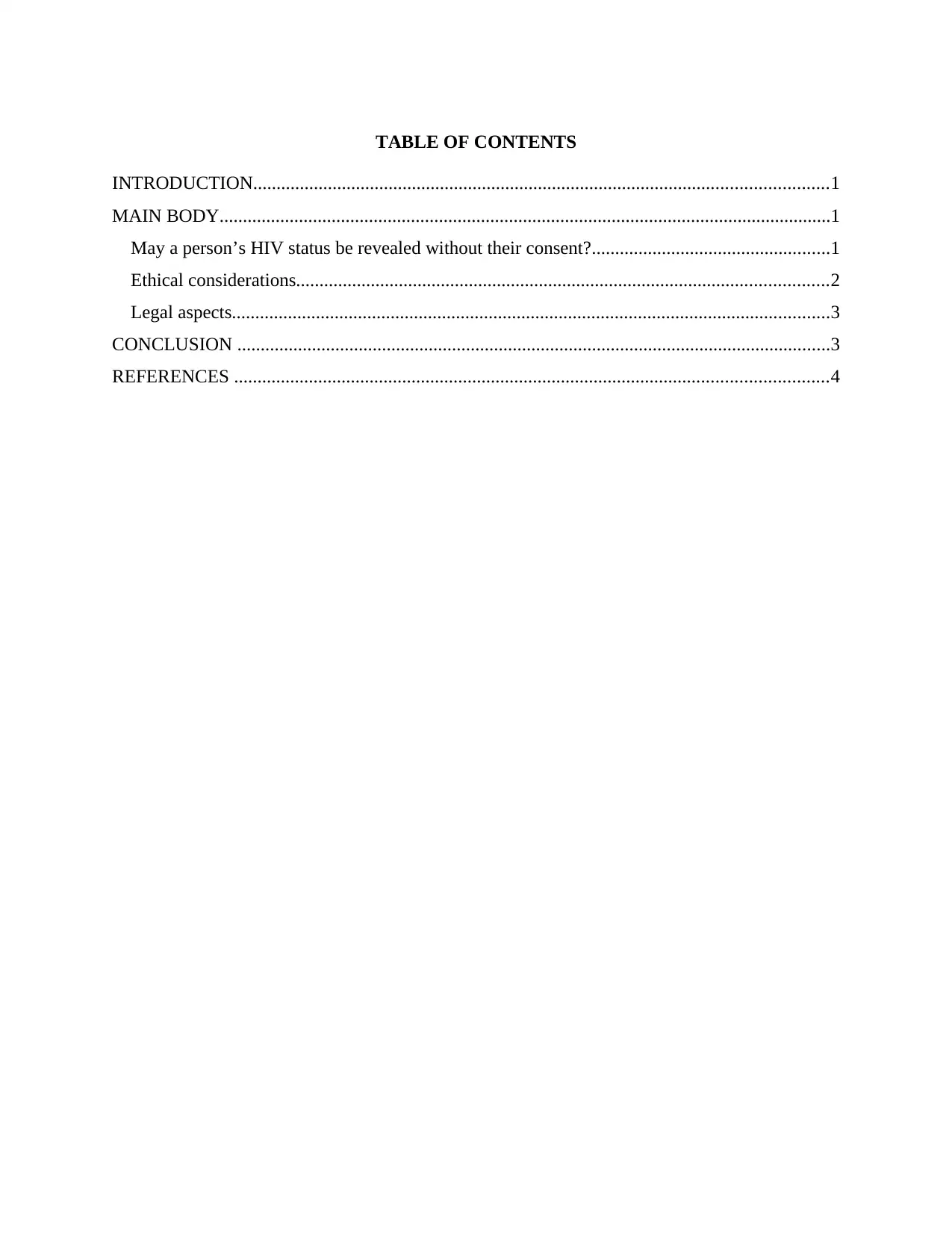
TABLE OF CONTENTS
INTRODUCTION...........................................................................................................................1
MAIN BODY...................................................................................................................................1
May a person’s HIV status be revealed without their consent?...................................................1
Ethical considerations..................................................................................................................2
Legal aspects................................................................................................................................3
CONCLUSION ...............................................................................................................................3
REFERENCES ...............................................................................................................................4
INTRODUCTION...........................................................................................................................1
MAIN BODY...................................................................................................................................1
May a person’s HIV status be revealed without their consent?...................................................1
Ethical considerations..................................................................................................................2
Legal aspects................................................................................................................................3
CONCLUSION ...............................................................................................................................3
REFERENCES ...............................................................................................................................4
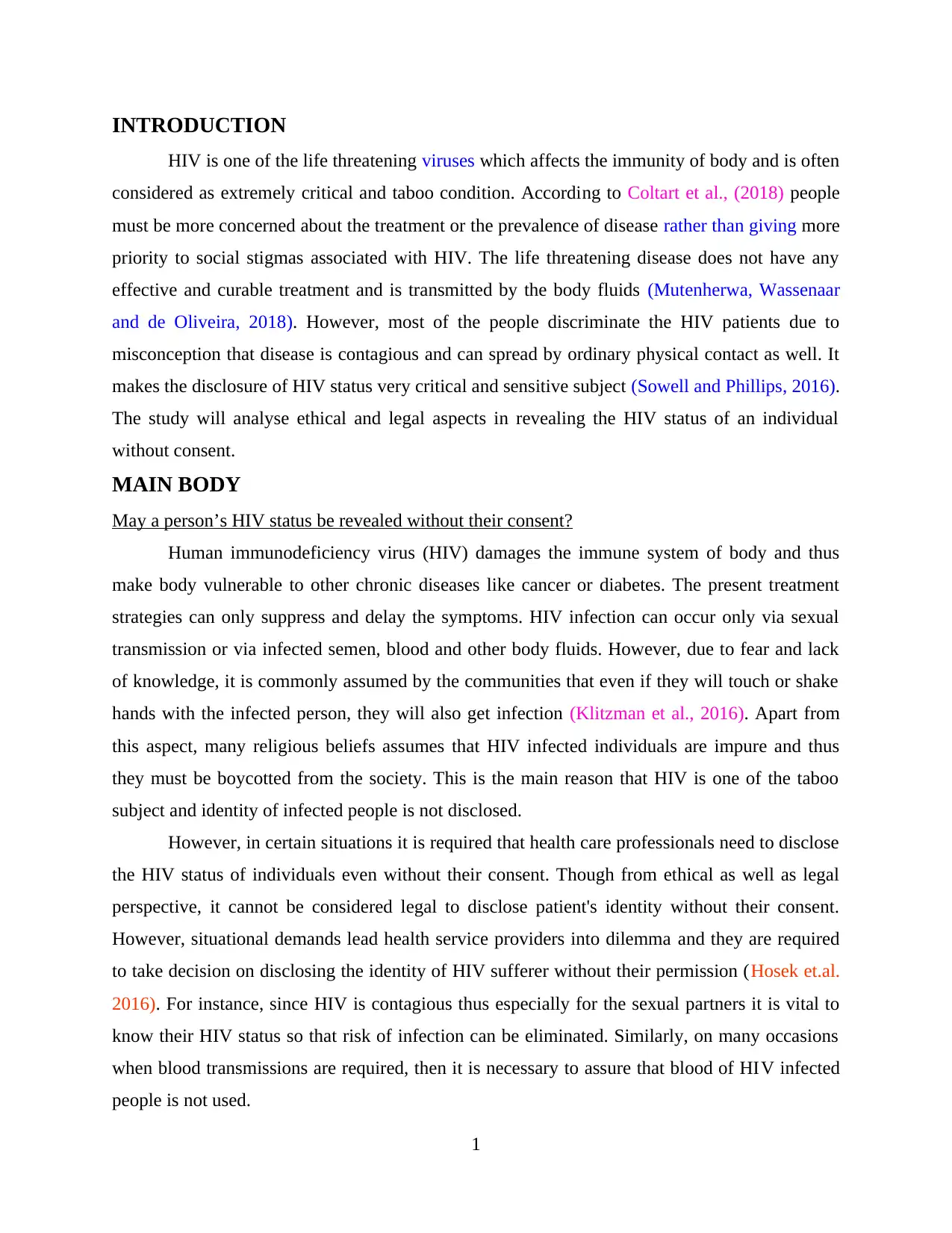
INTRODUCTION
HIV is one of the life threatening viruses which affects the immunity of body and is often
considered as extremely critical and taboo condition. According to Coltart et al., (2018) people
must be more concerned about the treatment or the prevalence of disease rather than giving more
priority to social stigmas associated with HIV. The life threatening disease does not have any
effective and curable treatment and is transmitted by the body fluids (Mutenherwa, Wassenaar
and de Oliveira, 2018). However, most of the people discriminate the HIV patients due to
misconception that disease is contagious and can spread by ordinary physical contact as well. It
makes the disclosure of HIV status very critical and sensitive subject (Sowell and Phillips, 2016).
The study will analyse ethical and legal aspects in revealing the HIV status of an individual
without consent.
MAIN BODY
May a person’s HIV status be revealed without their consent?
Human immunodeficiency virus (HIV) damages the immune system of body and thus
make body vulnerable to other chronic diseases like cancer or diabetes. The present treatment
strategies can only suppress and delay the symptoms. HIV infection can occur only via sexual
transmission or via infected semen, blood and other body fluids. However, due to fear and lack
of knowledge, it is commonly assumed by the communities that even if they will touch or shake
hands with the infected person, they will also get infection (Klitzman et al., 2016). Apart from
this aspect, many religious beliefs assumes that HIV infected individuals are impure and thus
they must be boycotted from the society. This is the main reason that HIV is one of the taboo
subject and identity of infected people is not disclosed.
However, in certain situations it is required that health care professionals need to disclose
the HIV status of individuals even without their consent. Though from ethical as well as legal
perspective, it cannot be considered legal to disclose patient's identity without their consent.
However, situational demands lead health service providers into dilemma and they are required
to take decision on disclosing the identity of HIV sufferer without their permission (Hosek et.al.
2016). For instance, since HIV is contagious thus especially for the sexual partners it is vital to
know their HIV status so that risk of infection can be eliminated. Similarly, on many occasions
when blood transmissions are required, then it is necessary to assure that blood of HIV infected
people is not used.
1
HIV is one of the life threatening viruses which affects the immunity of body and is often
considered as extremely critical and taboo condition. According to Coltart et al., (2018) people
must be more concerned about the treatment or the prevalence of disease rather than giving more
priority to social stigmas associated with HIV. The life threatening disease does not have any
effective and curable treatment and is transmitted by the body fluids (Mutenherwa, Wassenaar
and de Oliveira, 2018). However, most of the people discriminate the HIV patients due to
misconception that disease is contagious and can spread by ordinary physical contact as well. It
makes the disclosure of HIV status very critical and sensitive subject (Sowell and Phillips, 2016).
The study will analyse ethical and legal aspects in revealing the HIV status of an individual
without consent.
MAIN BODY
May a person’s HIV status be revealed without their consent?
Human immunodeficiency virus (HIV) damages the immune system of body and thus
make body vulnerable to other chronic diseases like cancer or diabetes. The present treatment
strategies can only suppress and delay the symptoms. HIV infection can occur only via sexual
transmission or via infected semen, blood and other body fluids. However, due to fear and lack
of knowledge, it is commonly assumed by the communities that even if they will touch or shake
hands with the infected person, they will also get infection (Klitzman et al., 2016). Apart from
this aspect, many religious beliefs assumes that HIV infected individuals are impure and thus
they must be boycotted from the society. This is the main reason that HIV is one of the taboo
subject and identity of infected people is not disclosed.
However, in certain situations it is required that health care professionals need to disclose
the HIV status of individuals even without their consent. Though from ethical as well as legal
perspective, it cannot be considered legal to disclose patient's identity without their consent.
However, situational demands lead health service providers into dilemma and they are required
to take decision on disclosing the identity of HIV sufferer without their permission (Hosek et.al.
2016). For instance, since HIV is contagious thus especially for the sexual partners it is vital to
know their HIV status so that risk of infection can be eliminated. Similarly, on many occasions
when blood transmissions are required, then it is necessary to assure that blood of HIV infected
people is not used.
1
⊘ This is a preview!⊘
Do you want full access?
Subscribe today to unlock all pages.

Trusted by 1+ million students worldwide
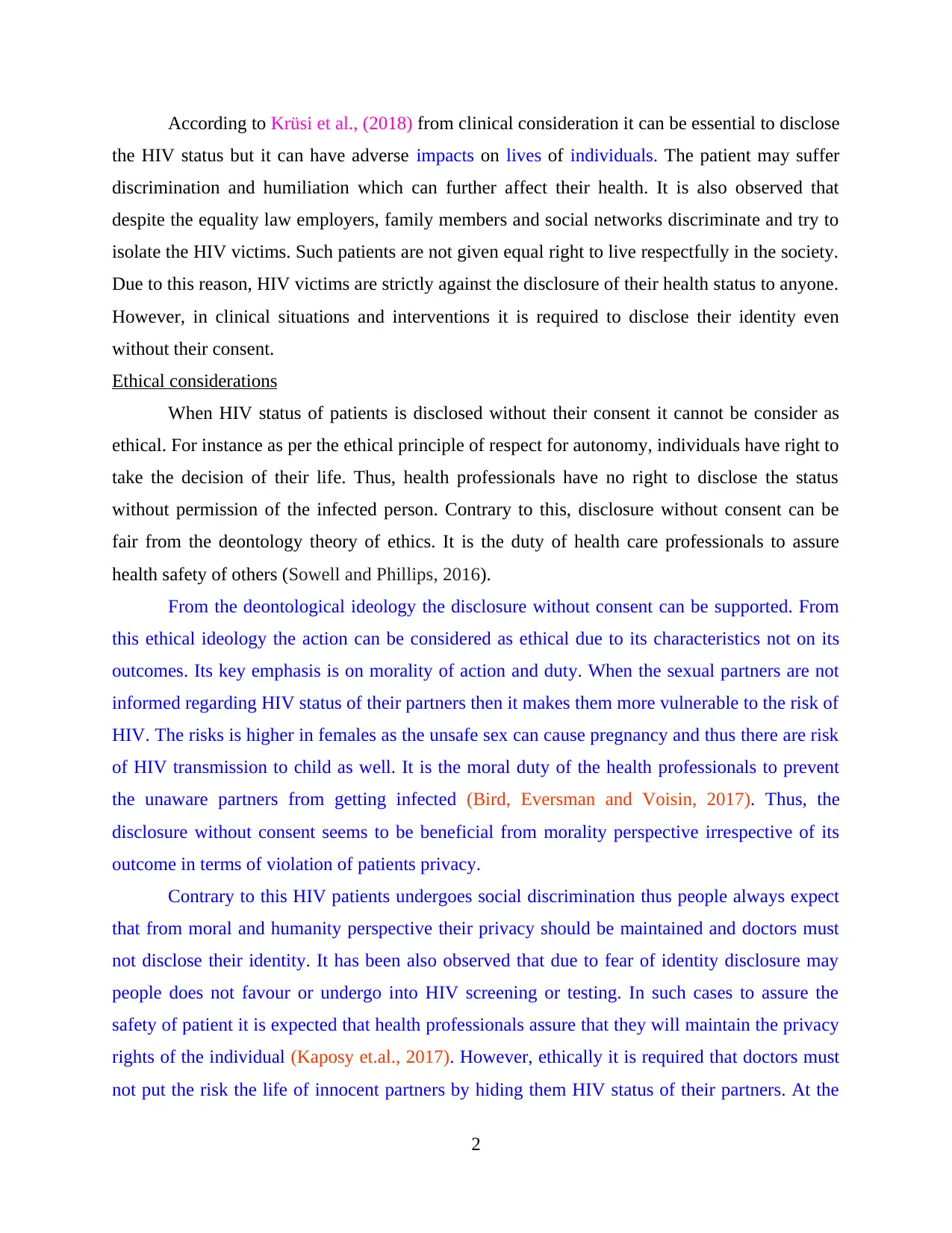
According to Krüsi et al., (2018) from clinical consideration it can be essential to disclose
the HIV status but it can have adverse impacts on lives of individuals. The patient may suffer
discrimination and humiliation which can further affect their health. It is also observed that
despite the equality law employers, family members and social networks discriminate and try to
isolate the HIV victims. Such patients are not given equal right to live respectfully in the society.
Due to this reason, HIV victims are strictly against the disclosure of their health status to anyone.
However, in clinical situations and interventions it is required to disclose their identity even
without their consent.
Ethical considerations
When HIV status of patients is disclosed without their consent it cannot be consider as
ethical. For instance as per the ethical principle of respect for autonomy, individuals have right to
take the decision of their life. Thus, health professionals have no right to disclose the status
without permission of the infected person. Contrary to this, disclosure without consent can be
fair from the deontology theory of ethics. It is the duty of health care professionals to assure
health safety of others (Sowell and Phillips, 2016).
From the deontological ideology the disclosure without consent can be supported. From
this ethical ideology the action can be considered as ethical due to its characteristics not on its
outcomes. Its key emphasis is on morality of action and duty. When the sexual partners are not
informed regarding HIV status of their partners then it makes them more vulnerable to the risk of
HIV. The risks is higher in females as the unsafe sex can cause pregnancy and thus there are risk
of HIV transmission to child as well. It is the moral duty of the health professionals to prevent
the unaware partners from getting infected (Bird, Eversman and Voisin, 2017). Thus, the
disclosure without consent seems to be beneficial from morality perspective irrespective of its
outcome in terms of violation of patients privacy.
Contrary to this HIV patients undergoes social discrimination thus people always expect
that from moral and humanity perspective their privacy should be maintained and doctors must
not disclose their identity. It has been also observed that due to fear of identity disclosure may
people does not favour or undergo into HIV screening or testing. In such cases to assure the
safety of patient it is expected that health professionals assure that they will maintain the privacy
rights of the individual (Kaposy et.al., 2017). However, ethically it is required that doctors must
not put the risk the life of innocent partners by hiding them HIV status of their partners. At the
2
the HIV status but it can have adverse impacts on lives of individuals. The patient may suffer
discrimination and humiliation which can further affect their health. It is also observed that
despite the equality law employers, family members and social networks discriminate and try to
isolate the HIV victims. Such patients are not given equal right to live respectfully in the society.
Due to this reason, HIV victims are strictly against the disclosure of their health status to anyone.
However, in clinical situations and interventions it is required to disclose their identity even
without their consent.
Ethical considerations
When HIV status of patients is disclosed without their consent it cannot be consider as
ethical. For instance as per the ethical principle of respect for autonomy, individuals have right to
take the decision of their life. Thus, health professionals have no right to disclose the status
without permission of the infected person. Contrary to this, disclosure without consent can be
fair from the deontology theory of ethics. It is the duty of health care professionals to assure
health safety of others (Sowell and Phillips, 2016).
From the deontological ideology the disclosure without consent can be supported. From
this ethical ideology the action can be considered as ethical due to its characteristics not on its
outcomes. Its key emphasis is on morality of action and duty. When the sexual partners are not
informed regarding HIV status of their partners then it makes them more vulnerable to the risk of
HIV. The risks is higher in females as the unsafe sex can cause pregnancy and thus there are risk
of HIV transmission to child as well. It is the moral duty of the health professionals to prevent
the unaware partners from getting infected (Bird, Eversman and Voisin, 2017). Thus, the
disclosure without consent seems to be beneficial from morality perspective irrespective of its
outcome in terms of violation of patients privacy.
Contrary to this HIV patients undergoes social discrimination thus people always expect
that from moral and humanity perspective their privacy should be maintained and doctors must
not disclose their identity. It has been also observed that due to fear of identity disclosure may
people does not favour or undergo into HIV screening or testing. In such cases to assure the
safety of patient it is expected that health professionals assure that they will maintain the privacy
rights of the individual (Kaposy et.al., 2017). However, ethically it is required that doctors must
not put the risk the life of innocent partners by hiding them HIV status of their partners. At the
2
Paraphrase This Document
Need a fresh take? Get an instant paraphrase of this document with our AI Paraphraser
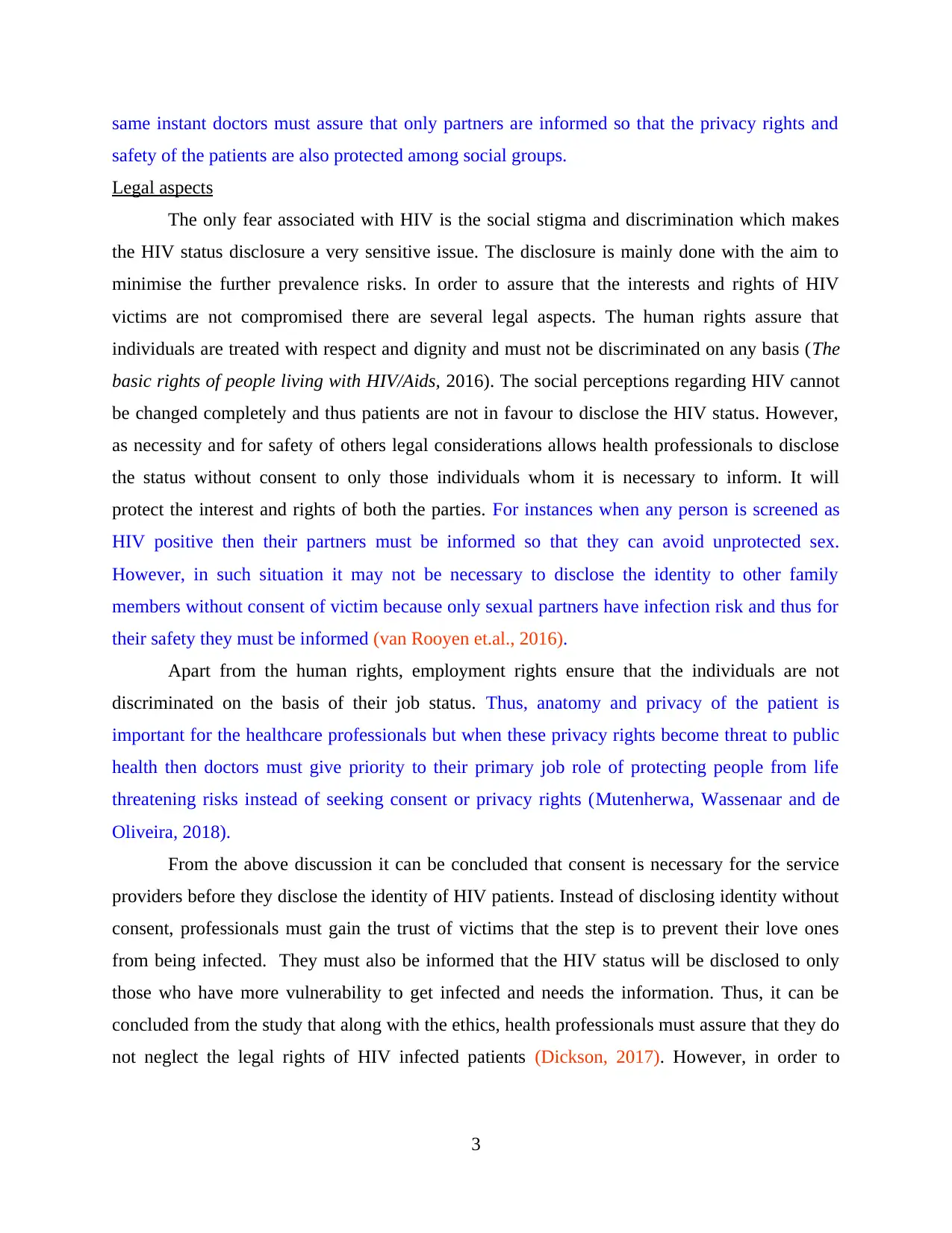
same instant doctors must assure that only partners are informed so that the privacy rights and
safety of the patients are also protected among social groups.
Legal aspects
The only fear associated with HIV is the social stigma and discrimination which makes
the HIV status disclosure a very sensitive issue. The disclosure is mainly done with the aim to
minimise the further prevalence risks. In order to assure that the interests and rights of HIV
victims are not compromised there are several legal aspects. The human rights assure that
individuals are treated with respect and dignity and must not be discriminated on any basis (The
basic rights of people living with HIV/Aids, 2016). The social perceptions regarding HIV cannot
be changed completely and thus patients are not in favour to disclose the HIV status. However,
as necessity and for safety of others legal considerations allows health professionals to disclose
the status without consent to only those individuals whom it is necessary to inform. It will
protect the interest and rights of both the parties. For instances when any person is screened as
HIV positive then their partners must be informed so that they can avoid unprotected sex.
However, in such situation it may not be necessary to disclose the identity to other family
members without consent of victim because only sexual partners have infection risk and thus for
their safety they must be informed (van Rooyen et.al., 2016).
Apart from the human rights, employment rights ensure that the individuals are not
discriminated on the basis of their job status. Thus, anatomy and privacy of the patient is
important for the healthcare professionals but when these privacy rights become threat to public
health then doctors must give priority to their primary job role of protecting people from life
threatening risks instead of seeking consent or privacy rights (Mutenherwa, Wassenaar and de
Oliveira, 2018).
From the above discussion it can be concluded that consent is necessary for the service
providers before they disclose the identity of HIV patients. Instead of disclosing identity without
consent, professionals must gain the trust of victims that the step is to prevent their love ones
from being infected. They must also be informed that the HIV status will be disclosed to only
those who have more vulnerability to get infected and needs the information. Thus, it can be
concluded from the study that along with the ethics, health professionals must assure that they do
not neglect the legal rights of HIV infected patients (Dickson, 2017). However, in order to
3
safety of the patients are also protected among social groups.
Legal aspects
The only fear associated with HIV is the social stigma and discrimination which makes
the HIV status disclosure a very sensitive issue. The disclosure is mainly done with the aim to
minimise the further prevalence risks. In order to assure that the interests and rights of HIV
victims are not compromised there are several legal aspects. The human rights assure that
individuals are treated with respect and dignity and must not be discriminated on any basis (The
basic rights of people living with HIV/Aids, 2016). The social perceptions regarding HIV cannot
be changed completely and thus patients are not in favour to disclose the HIV status. However,
as necessity and for safety of others legal considerations allows health professionals to disclose
the status without consent to only those individuals whom it is necessary to inform. It will
protect the interest and rights of both the parties. For instances when any person is screened as
HIV positive then their partners must be informed so that they can avoid unprotected sex.
However, in such situation it may not be necessary to disclose the identity to other family
members without consent of victim because only sexual partners have infection risk and thus for
their safety they must be informed (van Rooyen et.al., 2016).
Apart from the human rights, employment rights ensure that the individuals are not
discriminated on the basis of their job status. Thus, anatomy and privacy of the patient is
important for the healthcare professionals but when these privacy rights become threat to public
health then doctors must give priority to their primary job role of protecting people from life
threatening risks instead of seeking consent or privacy rights (Mutenherwa, Wassenaar and de
Oliveira, 2018).
From the above discussion it can be concluded that consent is necessary for the service
providers before they disclose the identity of HIV patients. Instead of disclosing identity without
consent, professionals must gain the trust of victims that the step is to prevent their love ones
from being infected. They must also be informed that the HIV status will be disclosed to only
those who have more vulnerability to get infected and needs the information. Thus, it can be
concluded from the study that along with the ethics, health professionals must assure that they do
not neglect the legal rights of HIV infected patients (Dickson, 2017). However, in order to
3

prevent others from the risk, HIV status can be disclosed without consent of HIV infected
person.
4
person.
4
⊘ This is a preview!⊘
Do you want full access?
Subscribe today to unlock all pages.

Trusted by 1+ million students worldwide
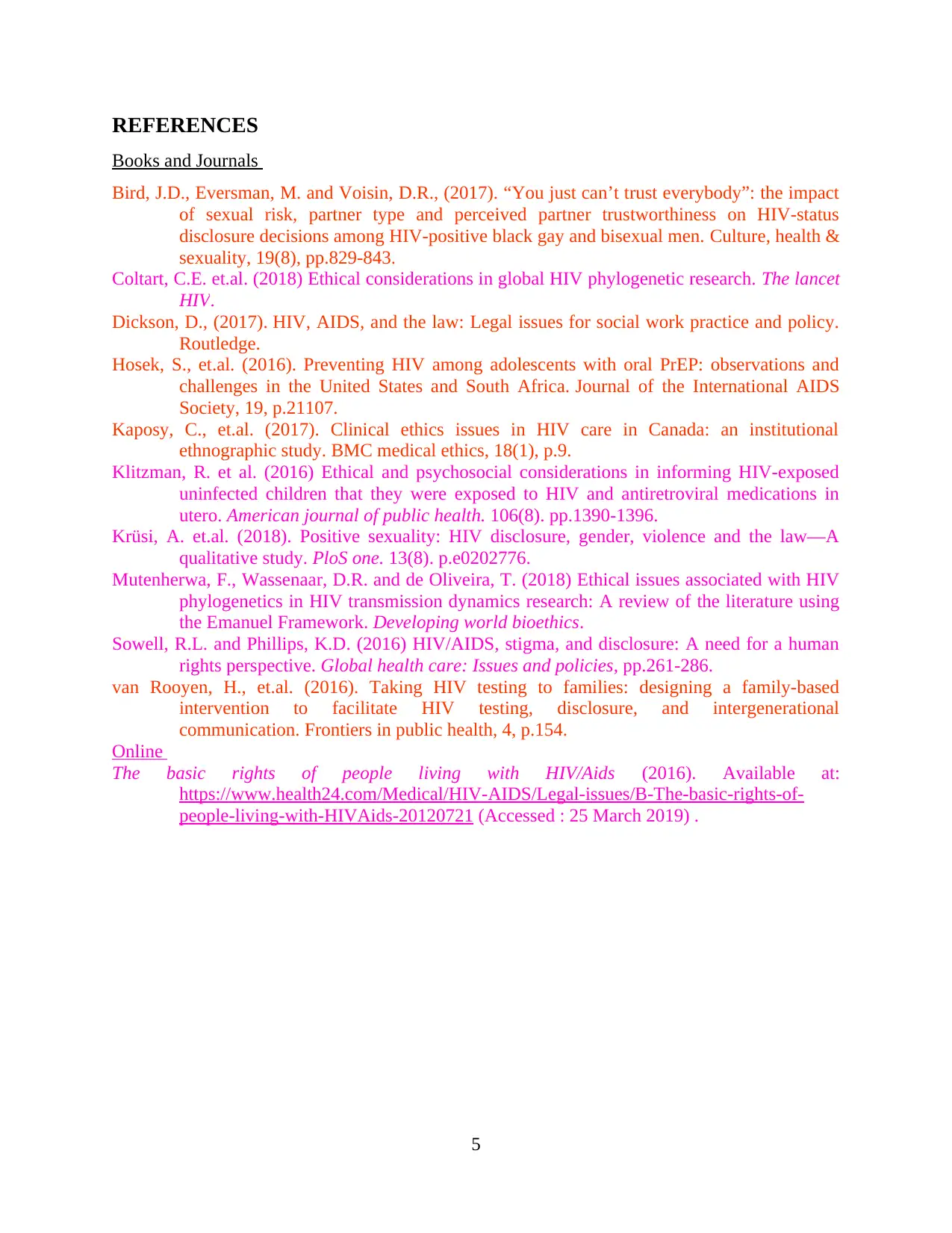
REFERENCES
Books and Journals
Bird, J.D., Eversman, M. and Voisin, D.R., (2017). “You just can’t trust everybody”: the impact
of sexual risk, partner type and perceived partner trustworthiness on HIV-status
disclosure decisions among HIV-positive black gay and bisexual men. Culture, health &
sexuality, 19(8), pp.829-843.
Coltart, C.E. et.al. (2018) Ethical considerations in global HIV phylogenetic research. The lancet
HIV.
Dickson, D., (2017). HIV, AIDS, and the law: Legal issues for social work practice and policy.
Routledge.
Hosek, S., et.al. (2016). Preventing HIV among adolescents with oral PrEP: observations and
challenges in the United States and South Africa. Journal of the International AIDS
Society, 19, p.21107.
Kaposy, C., et.al. (2017). Clinical ethics issues in HIV care in Canada: an institutional
ethnographic study. BMC medical ethics, 18(1), p.9.
Klitzman, R. et al. (2016) Ethical and psychosocial considerations in informing HIV-exposed
uninfected children that they were exposed to HIV and antiretroviral medications in
utero. American journal of public health. 106(8). pp.1390-1396.
Krüsi, A. et.al. (2018). Positive sexuality: HIV disclosure, gender, violence and the law—A
qualitative study. PloS one. 13(8). p.e0202776.
Mutenherwa, F., Wassenaar, D.R. and de Oliveira, T. (2018) Ethical issues associated with HIV
phylogenetics in HIV transmission dynamics research: A review of the literature using
the Emanuel Framework. Developing world bioethics.
Sowell, R.L. and Phillips, K.D. (2016) HIV/AIDS, stigma, and disclosure: A need for a human
rights perspective. Global health care: Issues and policies, pp.261-286.
van Rooyen, H., et.al. (2016). Taking HIV testing to families: designing a family-based
intervention to facilitate HIV testing, disclosure, and intergenerational
communication. Frontiers in public health, 4, p.154.
Online
The basic rights of people living with HIV/Aids (2016). Available at:
https://www.health24.com/Medical/HIV-AIDS/Legal-issues/B-The-basic-rights-of-
people-living-with-HIVAids-20120721 (Accessed : 25 March 2019) .
5
Books and Journals
Bird, J.D., Eversman, M. and Voisin, D.R., (2017). “You just can’t trust everybody”: the impact
of sexual risk, partner type and perceived partner trustworthiness on HIV-status
disclosure decisions among HIV-positive black gay and bisexual men. Culture, health &
sexuality, 19(8), pp.829-843.
Coltart, C.E. et.al. (2018) Ethical considerations in global HIV phylogenetic research. The lancet
HIV.
Dickson, D., (2017). HIV, AIDS, and the law: Legal issues for social work practice and policy.
Routledge.
Hosek, S., et.al. (2016). Preventing HIV among adolescents with oral PrEP: observations and
challenges in the United States and South Africa. Journal of the International AIDS
Society, 19, p.21107.
Kaposy, C., et.al. (2017). Clinical ethics issues in HIV care in Canada: an institutional
ethnographic study. BMC medical ethics, 18(1), p.9.
Klitzman, R. et al. (2016) Ethical and psychosocial considerations in informing HIV-exposed
uninfected children that they were exposed to HIV and antiretroviral medications in
utero. American journal of public health. 106(8). pp.1390-1396.
Krüsi, A. et.al. (2018). Positive sexuality: HIV disclosure, gender, violence and the law—A
qualitative study. PloS one. 13(8). p.e0202776.
Mutenherwa, F., Wassenaar, D.R. and de Oliveira, T. (2018) Ethical issues associated with HIV
phylogenetics in HIV transmission dynamics research: A review of the literature using
the Emanuel Framework. Developing world bioethics.
Sowell, R.L. and Phillips, K.D. (2016) HIV/AIDS, stigma, and disclosure: A need for a human
rights perspective. Global health care: Issues and policies, pp.261-286.
van Rooyen, H., et.al. (2016). Taking HIV testing to families: designing a family-based
intervention to facilitate HIV testing, disclosure, and intergenerational
communication. Frontiers in public health, 4, p.154.
Online
The basic rights of people living with HIV/Aids (2016). Available at:
https://www.health24.com/Medical/HIV-AIDS/Legal-issues/B-The-basic-rights-of-
people-living-with-HIVAids-20120721 (Accessed : 25 March 2019) .
5
Paraphrase This Document
Need a fresh take? Get an instant paraphrase of this document with our AI Paraphraser

6
1 out of 8
Related Documents
Your All-in-One AI-Powered Toolkit for Academic Success.
+13062052269
info@desklib.com
Available 24*7 on WhatsApp / Email
![[object Object]](/_next/static/media/star-bottom.7253800d.svg)
Unlock your academic potential
Copyright © 2020–2026 A2Z Services. All Rights Reserved. Developed and managed by ZUCOL.





